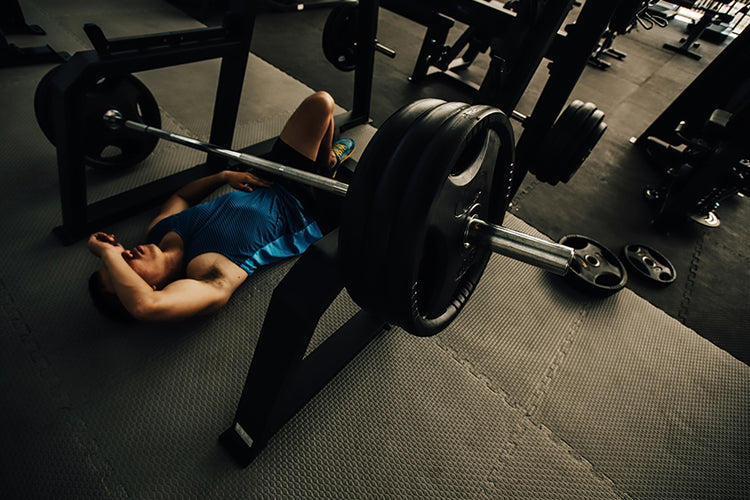Many people struggle to build muscle and gain weight, despite their best efforts. The journey to building muscle can be a long and challenging one, and there are many roadblocks that can hinder your progress.
But despite all, do you feel like you're putting in the effort at the gym, lifting heavy weights, and pushing yourself to the limit, but still can't seem to put on any significant muscle mass? Are you feeling frustrated with your lack of progress and wondering why you do not see the results you want?
Well, you're not alone and don't give up just yet. In this article, we'll delve into the top 12 reasons why you may not be building muscles and provide practical advice and solutions to help you overcome these obstacles.
These tips can help you make the progress you desire and achieve your fitness goals.
We'll cover everything from nutrition and workout routines to motivation and medical conditions.
So, if you're tired of feeling stuck and want to finally break through your plateau, read on for expert advice on how to build muscle and gain weight effectively.
12 Reasons Why You Might Not Be Making Progress
Here are 12 reasons why you may not be seeing the muscle gains you desire. From inadequate nutrition to poor workout techniques, we'll explore the common pitfalls that may be hindering your progress.
1. Lack of Proper Nutrition

If you do not see the muscle gains you desire, the problem may lie in your diet. Building muscle requires a steady supply of nutrients, particularly protein, to help repair and grow your muscles after a workout. Without enough nutrients, your body will struggle to build muscle mass and may even break down existing muscle tissue for energy.
To optimize your muscle-building potential, eating a well-balanced diet that includes the right combination of protein, carbohydrates, and fats is crucial. Many people make the mistake of focusing solely on protein and neglecting the other macronutrients, which can hinder your progress.
To plan your muscle-building diet, splitting it up into protein/carbohydrate/fat (P/C/F) ratios is helpful. One of the most effective ratios for muscle growth is 30/50/20, meaning you get 30% of your total calories from protein, 50% from carbohydrates, and 20% from fats.
For example, let's say you have a daily calorie goal of 3,260. To break it down into P/C/F ratios, you would aim for:
- 30% of 3,260 = 980 calories from protein
- Divide by 4, and that's 244 g of protein per day
- 50% of 3,260 = 1,630 calories from carbohydrates
- Divide by 4, and that's 408g carbs per day
- 20% of 3,260 = 650 calories from fat
- Divide by 9, and that's 72g of fat per day
Remember that these are just general guidelines, and your ideal P/C/F ratios may vary depending on your goals.
2. Inconsistent Workouts

One of the most common reasons people struggle to build muscle is inconsistency in their workouts. Skipping workouts, not following a structured routine, or not challenging yourself enough during your workouts can all hold you back from making progress.
You should have a consistent workout schedule and stick to it to see results. It means setting aside dedicated time for your workouts and treating them as a non-negotiable part of your routine. If you're finding it challenging to stick to a schedule, consider finding a workout buddy or hiring a personal trainer to help keep you accountable.
Consistency is also essential in terms of the exercises you're doing. It's important to work for all the major muscle groups regularly and to challenge yourself during each workout by gradually increasing the weight, reps, or intensity of your exercises.
It can help prevent your muscles from becoming accustomed to the same routine, which can limit growth. By prioritizing consistency and challenging yourself during workouts, you can optimize your muscle-building potential and see the results you've been working hard for.
Remember, building muscle is a marathon, not a sprint. It takes time, dedication, and consistency to see results, but with the right approach, you can achieve your goals.
3. Lack of Progressive Overload

Another critical factor in building muscle is progressive overload. This refers to the gradual increase in weight, reps, or intensity of your exercises over time. Without progressive overload, your muscles will not be sufficiently challenged and will not grow.
To incorporate progressive overload into your workouts, start by keeping track of the weights you use and the number of reps you complete for each exercise. Then, aim to gradually increase the weight or reps over time.
For example, if you've been lifting 10-pound dumbbells for bicep curls, try increasing to 12-pound dumbbells after a few weeks. Or, if you've been doing 10 reps of an exercise, aim to do 12 reps during your next workout.
Remember, progressive overload is a gradual process. It's important to be patient and not rush into lifting weights that are too heavy, which can lead to injury. Aim for small, consistent increases over time to see steady progress.
4. Lack of Sleep and Recovery

If you think your muscles grow while you're pumping iron, you're only partially correct. In fact, your muscles grow when you're not working out - during your rest periods, to be exact. That's why sleep and recovery are just as important as your workouts when it comes to building muscle.
Without sufficient sleep, your body simply won't be able to repair and grow your muscles effectively. In addition, not allowing for enough recovery time can lead to overtraining, injury, and, ultimately, lack of progress.
Aim for 7-8 hours of sleep every night, and make sure to take rest days in between your workouts. Here are some tips to help you get the most out of your sleep:
- Develop a consistent sleep routine.
- Avoid stressful activities in the hours leading up to bedtime.
- Refrain from consuming stimulants like caffeine or nicotine within 4-6 hours of bedtime.
- Have a light snack before bed to help promote relaxation and ease hunger.
Related Article: How to Optimize Your Exercise for Better Sleep, According to Fitness Experts
5. Poor Form and Technique

If you're working out but not seeing the results you want, it may be time to take a closer look at your exercise technique. Even if you're doing the right exercises, poor form and technique can limit your gains and lead to injury.
To make sure you're maximizing muscle activation and minimizing your risk of injury, focus on executing each movement with good form. Don't worry about how much weight you're lifting, and don't try to copy what others are doing in the gym.
Instead, follow these general rules for proper exercise technique:
- Start with lighter weights: If you're new to exercise, start with a lighter weight to ensure you can perform the movement correctly. Once you have the form down, gradually increase the weight.
- Focus on Muscle Contraction: As you perform each repetition, focus on contracting the muscle you're targeting. This will help you feel the muscle working and ensure you use the proper form.
- Get Feedback: Ask a trainer or experienced gym-goer to watch you perform an exercise and give feedback on your form. They may notice something you're missing or provide improvement tips.
- Use Mirrors: Most gyms have mirrors, which can be an excellent tool for checking your form. Watch yourself as you perform each exercise to ensure you're using the proper form.
- Adjust your Equipment: Make sure your equipment is adjusted to fit your body. For example, adjust the height of a bench or seat position to ensure you can perform the exercise with proper form.
6. Lack of Variety in Workouts

Doing the same workouts repeatedly can lead to a plateau in muscle growth. Your muscles adapt quickly to the same exercises and the same routine, and therefore, it's essential to mix up your workouts to challenge your muscles in different ways.
Adding variety to your workouts helps target different muscle groups, engages different fibers, and helps prevent boredom. If you're looking to spice up your workouts, consider changing your exercises every few weeks or adding in new movements.
You could also try different rep ranges and rest periods or increase the weight you're lifting. It's essential to keep track of your progress and adjust your workouts accordingly to keep challenging your muscles.
Another way to add variety to your workouts is by incorporating different types of training, such as cardio, strength training, HIIT, or yoga. Not only will this keep your workouts interesting, but it can also improve your overall fitness level and help prevent injuries.
Remember, muscle growth occurs when your muscles are challenged and forced to adapt. So don't be afraid to switch up your workouts and try new things to keep your muscles guessing and growing.
7. Overtraining

It's common to think that more is always better, but this isn't true in weight training. Overtraining can be just as detrimental as not training enough. Your body needs time to recover and rebuild muscle tissue; if you don't give it that time, you can end up causing more harm than good. Here are a few signs that you might be overtraining:
- Feeling tired and exhausted, even after a good night's sleep
- Lack of motivation and decreased enthusiasm for training
- Decreased strength and performance in the gym
- Increase in the frequency and severity of injuries
- Increased resting heart rate
If you're experiencing any of these symptoms, it's important to take a break from training and allow your body to rest and recover. Remember, more isn't always better; quality training is always more effective than quantity.
Related Article: Overtraining: What It Is, Signs, and Recovery
8. You're Not Patient Enough
Building muscle takes time, and it's easy to get frustrated when you do not see results as quickly as you'd like. However, impatience can be one of the biggest obstacles to achieving muscle-building goals. Here are a few things to keep in mind:
- Remember that building muscle is slow, and results won't happen overnight.
- Don't compare yourself to others. Everyone's body is different, and progress will happen at different rates.
- Keep track of your progress, whether it's measurements, weight lifted, or how your clothes fit. This will help you see your progress, even if it's not immediately visible.
- Celebrate small victories. Every pound of muscle gained or increase in weight lifted is a step in the right direction.
- Stay consistent with your workouts and diet. Results will come if you stick with them.
By staying patient and consistent, you will see progress over time and achieve your muscle-building goals.
9. Lack of Proper Supplements

In addition to a well-rounded diet and consistent exercise routine, supplements can play a crucial role in supporting muscle growth and recovery.
Without the right supplements, you may be missing out on key nutrients and compounds that could be helping you achieve your fitness goals. Here are three essential supplements you should consider incorporating into your regimen:
- Pre-Workout: If you find yourself struggling to summon the energy and focus needed for intense workouts, a Pre-Workout Supplement may be just what you need. These supplements typically contain caffeine and other stimulants to increase energy and alertness, as well as ingredients like beta-alanine to improve endurance and delay fatigue.
- Post-Workout: After a tough workout, your muscles need the right nutrients to repair and grow. A Post-Workout Powder can help speed up this recovery process and may include protein to help rebuild muscle tissue, carbohydrates to replenish glycogen stores, and electrolytes to restore hydration levels.
- Creatine Powder: Creatine is a naturally occurring compound found in muscle tissue that can help improve strength, power, and endurance. A Creatine Supplement can help you get the most out of your workouts, particularly if you're engaged in high-intensity activities like weightlifting or sprinting.
10. Dehydration

Dehydration is not only dangerous, but it can also negatively impact your performance in the gym. When you're dehydrated, your body has a harder time regulating its temperature, which can lead to fatigue, cramping, and even fainting. It's important to keep your body hydrated, especially during intense workouts.
As a general rule, aim to drink at least 8-10 glasses of water per day. If you're working out regularly, you may need to drink more to replace the fluids you lose through sweat. And don't just rely on thirst to tell you when to drink.
As mentioned earlier, certain supplements, such as creatine, can lead to dehydration. If you're using these supplements, make sure to increase your water intake accordingly.
Don't let dehydration hold you back from achieving your fitness goals. Stay hydrated, and watch your performance improve.
11. You're Not Training Your Legs

Alright, let's talk about leg day! It may not be as glamorous as bench pressing or curling, but neglecting your leg training can seriously hinder your overall progress. Not to mention, you don't want to end up with a top-heavy physique that looks out of balance.
But it's not just about aesthetics. Leg exercises like squats, lunges, and deadlifts are incredibly taxing on the body, which means they trigger the release of growth hormone, leading to overall muscle growth.
Plus, these exercises use so many different muscle groups, including your core and upper body, that they can have a positive impact on your overall strength. So, don't skip leg day! Incorporate some challenging leg exercises into your routine and watch as your entire body gets stronger and more well-rounded.
Need some guidance on how to properly execute these exercises? Check out our leg workouts section for detailed instructions and technique tips.
Related Article: Top 15 Leg Mass Building Exercises of All-Time
12. Lack of Motivation and Accountability

It's no secret that getting and staying motivated can be a challenge. It's easy to get discouraged when progress seems slow or nonexistent. But if you want to achieve your fitness goals, you have to find ways to stay motivated and hold yourself accountable.
One effective way to stay motivated is to set specific, measurable goals. Instead of just saying, "I want to get in shape," set a goal like, "I want to lose 10 pounds in the next three months." Having a specific goal gives you something to work towards and allows you to track your progress along the way.
Another way to stay motivated is to find a workout partner or join a fitness group. Having someone to work out with can provide accountability and support. You're less likely to skip a workout if you know someone is counting on you to show up.
Fitness is a journey, not a destination, and setbacks are a part of the process. Just keep showing up, stay consistent, and stay motivated. The results will come with time and effort.
The Bottom Line
In conclusion, building muscle is a complex process that requires effort, dedication, and patience. It's not just about going to the gym and lifting weights but also about having a solid nutrition plan, getting enough rest, staying hydrated, and using the right supplements.
If you've been struggling to build muscle, take a closer look at the 12 reasons we discussed in this article and see where you may be going wrong. Remember to keep yourself motivated, and don't be afraid to ask for help when needed.
With the right approach, you can achieve your muscle-building goals and transform your body into the physique you desire. Good luck!











